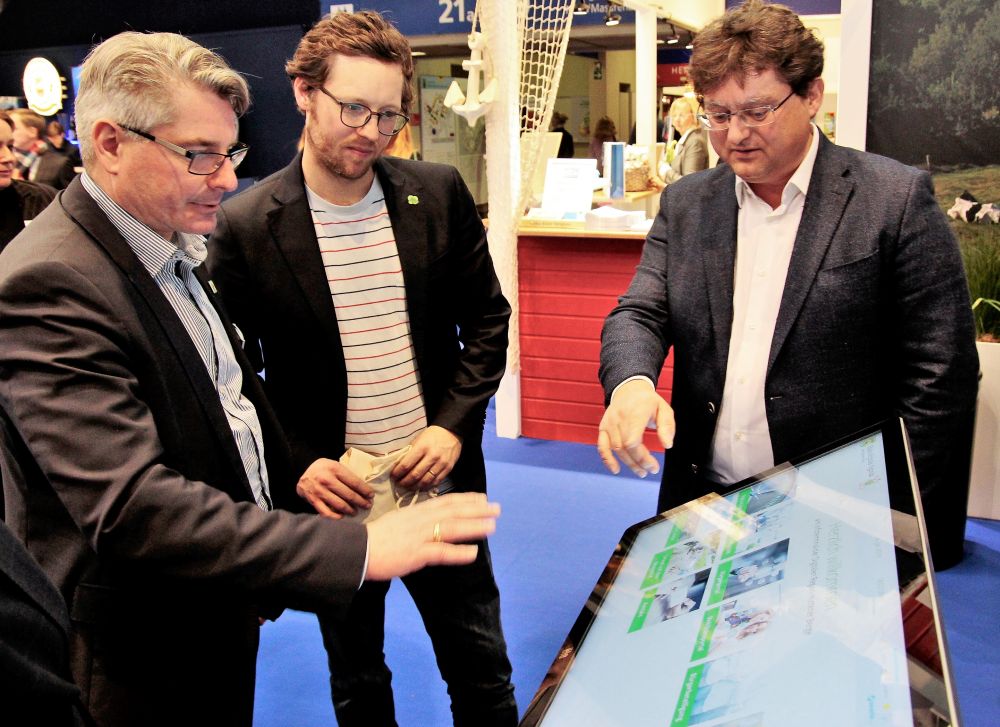Since 2018, the Municipality of Hüttener Berge in Schleswig-Holstein has been part of the project “CORA – COnnecting Remote Areas with Digital Infrastructure and Services”. The project is funded by the European Union under the Interreg North Sea Region programme with 18 partners from seven European countries dealing with digitalisation in rural areas. With CORA, Hüttener Berge is collecting first valuable experiences in the European context. In this interview, Mr Andreas Betz, the director of the Hüttener Berge Municipality office, explains which measures have already been implemented within the CORA project and why such transnational cooperation is important.
What are the objectives of the Hüttener Berge Municipality within the CORA project?
Andreas Betz: Our goals within the project are the creation of new digital services and improving digital skills: the citizens of Hüttener Berge should be able to digitally inform themselves about all municipal and tourist matters and be able to confidently deal with digital devices and applications. It is not enough to deploy fast internet infrastructure – one also has to introduce the technologies and applications to the people. Our activities in the CORA project contribute to the implementation of our Digital Agenda. We are on the way from establishing a digital agenda to becoming a digital region.
What digital infrastructure is to be installed in the framework of the CORA project?
Betz: For example, in the Hüttener Berge office, we set up digital information terminals – so-called e-screens – that are financed through the CORA project. These terminals display news and event information for our citizens and for tourists. If we as the municipality administration enter a new message or an event, the information appears automatically on our website and on the terminals. We asked our 16 local councils where the terminals should be located. Together, we identified five locations and plan to install the terminals in autumn 2019.
Five e-screens are already in operation. These are 86-inch-large touch screens that are as easy to use as tablets. For example, we can show a presentation and write down information with a suitable pen. One screen is already installed in our boardroom, one e-screen is installed in a school and three screens in the village community centres. The e-screens are very well received.
How do you improve digital skills of the inhabitants?
Betz: Digitisation will continue to change society. Together with the Broadband Competence Centre Schleswig-Holstein (BKZSH) we have developed a concept for improving digital skills in Hüttener Berge. We started by educating older people how to use tablets and smartphones. For this purpose, the Broadband Competence Centre has acquired equipment that is being used to explain how e.g. Skype works. The participants can also bring their own devices and ask questions.
The next step is to introduce the teaching of digital skills in the four elementary schools. We have purchased 80 convertible laptops and distributed them to our elementary schools. The digital skills are being taught to students and teachers on these devices.
What insights have you already gained from the CORA project?
Betz: The interest in digital services and the demand for digital devices is huge in Hüttener Berge! We always involve the potential users in the decisions: our project managers interview administration employees, school managers and the citizens as well as collect ideas and suggestions in various working groups. We noticed that the new technologies are very popular.
We seem to be on a good way. In exchange with the other European countries involved, we found that they, too, have developed a digital agenda and are dealing with similar issues as we do. We constantly discuss our digital agendas and exchange some helpful aspects. Networking and sharing information are very valuable.
What advice would you give to other municipalities that want to participate in an international project and develop digital services for their citizens?
Betz: Participation in an international project is a great opportunity! It is important to network with other municipalities even more intensively. At the moment many municipalities are reinventing the wheel. Instead we could learn much more from each other and implement processes that work – in Germany, but also in Europe, in order to make faster progress. In terms of digital services, we believe that first, each community should develop a digital agenda, work out areas for actions, and implement the actions it has developed for the next five years after prioritization. Digitization only works if an overall strategy is setup and is implemented step by step in a continuous process.
Previous experience has shown that it has always been right to make digitization a top priority and to involve the citizens, the political committees and the administration.

Photocredits: Amt Hüttener Berge. Director Andreas Betz (l.) presents the CORA project on the newly acquired touch screen to visitors of the International Green Week 2019.
Top image. Photocredits: Florian Käselau. Wouter Degadt (left, Intercommunale Leiedal, CORA Lead Partner), Andreas Betz (Director of the Hüttener Berge Municipality office ) and Peyman Khodabakhsh (Project Manager at aconium GmbH) with a touchscreen, which was acquired as part of the CORA project for the Hüttener Berge office.


